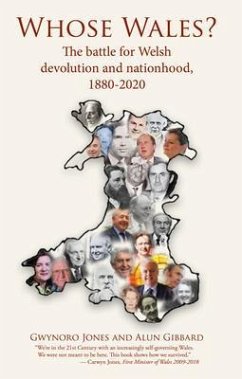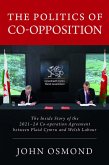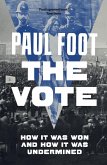So whose Wales is it?
There is a degree of ambiguity that runs through Welsh politics that in turn has hindered discussions of a clear Welsh political identity.
Can any one party claim to have done more than any other in the fight for securing and then developing Welsh devolution? The track record of all four main players, Liberal, Labour, Conservative and Plaid Cymru, is looked at, from the time of Queen Victoria to these days of devolution and Yes Cymru.
From one of the leading proponents of the devolution of Wales, Gwynoro Jones, and an award-winning author and former BBC journalist, Alun Gibbard, this well illustrated book looks at these often-bitter claims and counterclaims.
Alun Gibbards' insightful documenting and analysis complement Gwynoro Jones' first-hand experience and knowledge in a project that is unique in its scope and structure.
Between 1536 and 1542 the regime of Henry VIII incorporated Wales into England. Wales was to have no separate existence. Its language was banned from public life and its legal system abolished. It was meant to disappear. Yet here we are in the 21st Century with an increasingly self-governing Wales with a strong sense of identity and a pride in its language.
Alun Gibbard and Gwynoro Jones have traced the revival of Wales from the industrialising country of the 1880s and the nonconformist consciousness that led to Sunday closing. They describe the bitter battles over devolution in the 1970s through to the small margin in favour of a Welsh Assembly in 1997 and on to the well-established lawmaking, tax-varying Parliament with solid public support that we see today. We were not meant to be here. This book shows how we survived.
Carwyn Jones First Minister of Wales 2009-2018
The rhetorical question in the book's title, Whose Wales? echoes the kind of questions which historians and political commentators have raised over the decades, from Gwyn Alf Williams' When was Wales? to Dai Smith's enigmatic question in the title of his book on Welsh politics, Wales! Wales?
Professor Sir Deian Hopkin.
There is a degree of ambiguity that runs through Welsh politics that in turn has hindered discussions of a clear Welsh political identity.
Can any one party claim to have done more than any other in the fight for securing and then developing Welsh devolution? The track record of all four main players, Liberal, Labour, Conservative and Plaid Cymru, is looked at, from the time of Queen Victoria to these days of devolution and Yes Cymru.
From one of the leading proponents of the devolution of Wales, Gwynoro Jones, and an award-winning author and former BBC journalist, Alun Gibbard, this well illustrated book looks at these often-bitter claims and counterclaims.
Alun Gibbards' insightful documenting and analysis complement Gwynoro Jones' first-hand experience and knowledge in a project that is unique in its scope and structure.
Between 1536 and 1542 the regime of Henry VIII incorporated Wales into England. Wales was to have no separate existence. Its language was banned from public life and its legal system abolished. It was meant to disappear. Yet here we are in the 21st Century with an increasingly self-governing Wales with a strong sense of identity and a pride in its language.
Alun Gibbard and Gwynoro Jones have traced the revival of Wales from the industrialising country of the 1880s and the nonconformist consciousness that led to Sunday closing. They describe the bitter battles over devolution in the 1970s through to the small margin in favour of a Welsh Assembly in 1997 and on to the well-established lawmaking, tax-varying Parliament with solid public support that we see today. We were not meant to be here. This book shows how we survived.
Carwyn Jones First Minister of Wales 2009-2018
The rhetorical question in the book's title, Whose Wales? echoes the kind of questions which historians and political commentators have raised over the decades, from Gwyn Alf Williams' When was Wales? to Dai Smith's enigmatic question in the title of his book on Welsh politics, Wales! Wales?
Professor Sir Deian Hopkin.
Dieser Download kann aus rechtlichen Gründen nur mit Rechnungsadresse in A, D ausgeliefert werden.









